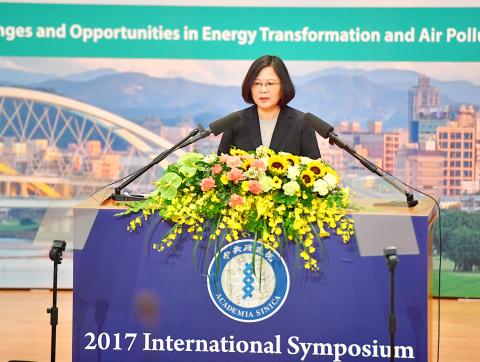Taiwan has the potential to become a global leader in renewable energy development if it succeeds in energy transformation, President Tsai Ing-wen (蔡英文) told an international symposium in Taipei yesterday.
The International Symposium on Sustainability Science was held by the Academia Sinica and attended by about 350 academics from the US, Japan, Australia and other countries.
The symposium aims to raise international awareness about sustainability and air pollution; to promote international collaboration; and bring international views and experiences to local communities, Academia Sinica President James Liao (廖俊智) said.

Photo: CNA
In her opening speech, Tsai quoted former US president Barack Obama as saying at the UN Climate Summit in 2014: “We are the first generation to feel the effect of climate change and the last generation who can do something about it.”
Although Taiwan is not a UN member, it endeavors to contribute to sustainable development in its region and in the world, she said.
As the government plans to generate 20 percent of the nation’s electricity from renewable energy sources by 2025, it is working to develop the sector by attracting domestic and foreign investments, and by promoting the Executive Yuan’s Forward-looking Infrastructure Development Program, she said.
“One of the world’s best wind farm sites is off Changhua County,” Tsai said.
In the first panel discussion, International Council for Science president Gordon McBean asked how Taiwan plans to achieve its renewable energy generation goal.
“It is a difficult goal,” Vice Minister of Economic Affairs Yang Wei-fu (楊偉甫) said, adding that the ministry is working to achieve the goal by promoting a two-year photovoltaic power project and a four-year offshore wind power project.
Speaking about the nation’s decarbonization goal, Yang said the ministry plans to improve coal-burning facilities at state-run utilities, such as Taiwan Power Co (Taipower) and CPC Corp, Taiwan.
Taipower has budgeted NT$9 billion (US$297.6 million) to install desulfurization facilities at its coal-fired and gas-fired power plants, Yang said, adding that the ministry is working closely with the Environmental Protection Administration to curb air pollution.
As for Vice President Chen Chien-jen’s (陳建仁) statement on Saturday that the nation can phase out coal-fired power plants by 2050, Yang said it is “a vision” without a concrete plan at present.
To phase out coal-fired power plants, the nation must have sufficient and diversified sources of energy, especially when the transportation and storage of natural gas have certain risks, he said.
In related news, the National Applied Research Laboratories is today to establish a “green” energy research alliance in Tainan in a bid to integrate industrial and academic resources to promote renewable energy development in the planned Shalun Green Energy Science City.

Taiwanese can file complaints with the Tourism Administration to report travel agencies if their activities caused termination of a person’s citizenship, Mainland Affairs Council Minister Chiu Chui-cheng (邱垂正) said yesterday, after a podcaster highlighted a case in which a person’s citizenship was canceled for receiving a single-use Chinese passport to enter Russia. The council is aware of incidents in which people who signed up through Chinese travel agencies for tours of Russia were told they could obtain Russian visas and fast-track border clearance, Chiu told reporters on the sidelines of an event in Taipei. However, the travel agencies actually applied

New measures aimed at making Taiwan more attractive to foreign professionals came into effect this month, the National Development Council said yesterday. Among the changes, international students at Taiwanese universities would be able to work in Taiwan without a work permit in the two years after they graduate, explainer materials provided by the council said. In addition, foreign nationals who graduated from one of the world’s top 200 universities within the past five years can also apply for a two-year open work permit. Previously, those graduates would have needed to apply for a work permit using point-based criteria or have a Taiwanese company

The Shilin District Prosecutors’ Office yesterday indicted two Taiwanese and issued a wanted notice for Pete Liu (劉作虎), founder of Shenzhen-based smartphone manufacturer OnePlus Technology Co (萬普拉斯科技), for allegedly contravening the Act Governing Relations Between the People of the Taiwan Area and the Mainland Area (臺灣地區與大陸地區人民關係條例) by poaching 70 engineers in Taiwan. Liu allegedly traveled to Taiwan at the end of 2014 and met with a Taiwanese man surnamed Lin (林) to discuss establishing a mobile software research and development (R&D) team in Taiwan, prosecutors said. Without approval from the government, Lin, following Liu’s instructions, recruited more than 70 software

Chinese spouse and influencer Guan Guan’s (關關) residency permit has been revoked for repeatedly posting pro-China videos that threaten national security, the National Immigration Agency confirmed today. Guan Guan has said many controversial statements in her videos posted to Douyin (抖音), including “the red flag will soon be painted all over Taiwan” and “Taiwan is an inseparable part of China,” and expressing hope for expedited reunification. The agency last year received multiple reports alleging that Guan Guan had advocated for armed reunification. After verifying the reports, the agency last month issued a notice requiring her to appear and explain her actions. Guan